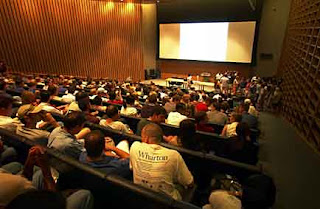 An interesting article came through on Alternet this weekend discussing the the corporatization of university education in the United States. Author Chris Hedges discusses not a corporate takeover per se, but instead how the knowledge and morals of the corporate world have become the dominant paradigm in higher education. He notes the decline in studies of the humanities accompanied by the increase in business degrees.
An interesting article came through on Alternet this weekend discussing the the corporatization of university education in the United States. Author Chris Hedges discusses not a corporate takeover per se, but instead how the knowledge and morals of the corporate world have become the dominant paradigm in higher education. He notes the decline in studies of the humanities accompanied by the increase in business degrees. "Only 8 percent of U.S. college graduates now receive degrees in the humanities, about 110,000 students. Between 1970 and 2001, bachelor's degrees in English declined from 7.6 percent to 4 percent, as did degrees in foreign languages (2.4 percent to 1 percent), mathematics (3 percent to 1 percent), social science and history (18.4 percent to 10 percent). Bachelor's degrees in business, which promise the accumulation of wealth, have skyrocketed. Business majors since 1970-1971 have risen from 13.6 percent of the graduation population to 21.7 percent. Business has now replaced education, which has fallen from 21 percent to 8.2 percent, as the most popular major."
This change over the years has led to a generation (or more) of college educated citizens who are less critical, less morally aware, and who value the competition over real human needs. He offers a decidedly bleak outcome of such developments:
"The values that sustain an open society have been crushed. A university, as John Ralston Saul writes, now "actively seeks students who suffer from the appropriate imbalance and then sets out to exaggerate it. Imagination, creativity, moral balance, knowledge, common sense, a social view -- all these things wither. Competitiveness, having an ever-ready answer, a talent for manipulating situations -- all these things are encouraged to grow. As a result amorality also grows; as does extreme aggressivity when they are questioned by outsiders; as does a confusion between the nature of good versus having a ready answer to all questions. Above all, what is encouraged is the growth of an undisciplined form of self-interest, in which winning is what counts.""
As a university instructor I can attest to some of these changes, and might add that students are resistant to thinking outside the box. Many - if not most - students want straight forward facts that they can regurgitate on an exam to get their A and move onto the next semester. Learning, thinking, debating, developing critical thinking skills - these are all distant afterthoughts for many of my students, and I'm sure this is a commonality across the U.S.
The popular press seems to be at a loss when trying to explain many of the events surrounding the recent economic downturn - especially concerning the greed that seems to embody the many corporate institutions involved. Perhaps some of these events can be explained (and even justified) if we take a look at the training and education that this new generation of corporate executives is receiving. We have to look somewhere - and attempt to address the problem - otherwise we risk repetition of such events and the continued valuation of profit and reward at any cost.
Continue reading the Alternet article here>>>

No comments:
Post a Comment
Having trouble leaving a comment? Some browsers require acceptance of 3rd party cookies. If you leave an anonymous comment, it may need to be approved.